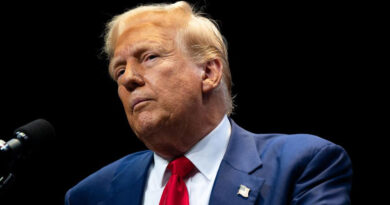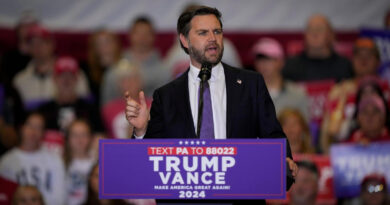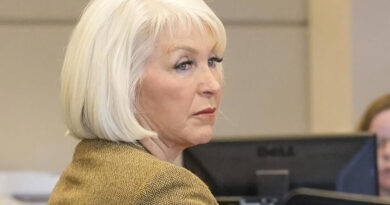The Coup de Grâce for Nikki Haley’s Presidential Aspirations
“I don’t think he’s going to be in the picture. I don’t think he can. He’s fallen so far.” Thus spoke Nikki Haley — former South Carolina governor, former ambassador to the UN, and now presidential aspirant — exposing once again her self-serving bona fides. In denigrating Donald Trump, the establishment Republican ended up revealing to Trump’s loyal base of 75-80 million supporters just how much she is motivated by opportunism. Also, just how out of touch she is with the rank and file.
Haley’s betrayal of President Trump took the form of a forceful condemnation: “We need to acknowledge he let us down. He went down a path he shouldn’t have, and we shouldn’t have followed him, and we shouldn’t have listened to him again. And we can’t let that ever happen again.” The timing of the tirade couldn’t have been more opportune: for maximum political effect, she released it just before Trump’s legal team presented his defense.
Making common cause with Democrats and disaffected
Republicans, she held Trump responsible for the January 6th Capitol riot, disingenuously telling members of the Republican National Committee that the president “will be harshly judged by history.” Does she believe her own words, or is this political theater? She was surely privy to Trump’s several recordings, importuning followers “to peacefully and patriotically make your voices heard.” She would also have been aware of other events that exonerated Trump from the false charges of fomenting a so-called “insurrection.” Many publications reported that planning for the Capitol attack occurred openly online for weeks. Known Antifa members disguised in MAGA attire played a part in the riots, as did at least one prominent Black Lives Matter activist. Despite knowing this, she chose to blame the president for political advantage.
Haley gratuitously stated that she’s “deeply disturbed” by Trump’s actions since the election, adding, “The person that I worked with is not the person that I have watched since the election.” She gave no credence to evidence of election fraud but made this insidious statement: “I understand that genuinely, to his core, he believes he was wronged.”
This was not the first time the former ambassador used her political pulpit to slur the president. In 2017, she referenced a maliciously mischaracterized episode to proclaim that Trump “was wrong with his words in Charlottesville.” Again, it has been repeated often enough that Trump unequivocally observed that “there were very fine people on both sides” of the Robert E. Lee Park-naming protest and distinctly stated, “I’m not talking about the neo-Nazis and white nationalists because they should be condemned totally.”
There are many recent examples of Haley’s political opportunism. At the time of the June 2020 hoax involving black NASCAR driver Bubba Wallace, she tweeted, “We should all stand with @BubbaWallace today against the cowards who secretly put the noose in his garage stall.” An FBI investigation determined the item in question was nothing but an ordinary garage door-pull.
All this is of a piece with Haley’s attempts to set herself apart from other Republican contenders as a champion of minority rights by taking issue with the party’s approach to minorities, and emphasizing the “hurt” imposed by symbols such as the Confederate flag after previously having been a supporter of the flag. In 2015, she spuriously criticized the party’s approach to minorities, “The problem for our party is that our approach often appears cold and unwelcoming to minorities. That’s shameful and it has to change.”
 As part of her political machinations to craft and refine her neocon image, Haley resigned from a short tenure on the board of directors at Boeing when it was announced that the company was seeking federal support to weather the coronavirus crisis. Although a view that was at direct odds with her actions as South Carolina’s governor, she ascertained that opposition to government bailouts of private business would be a more advantageous position to take with her potential base.
As part of her political machinations to craft and refine her neocon image, Haley resigned from a short tenure on the board of directors at Boeing when it was announced that the company was seeking federal support to weather the coronavirus crisis. Although a view that was at direct odds with her actions as South Carolina’s governor, she ascertained that opposition to government bailouts of private business would be a more advantageous position to take with her potential base.
In 2014, during her second term as governor, Haley had approved generous state-backed incentives for several corporations in South Carolina. These, in turn, had contributed to her campaign. Her Democrat opponent, Vincent Sheheen, had charged that “taxpayers are getting ripped off and nobody knows it.” Since her incentives policy gave dismal results in terms of job creation and tax revenue, Sheheen had said, “If private businesses get incentives, we should hold them to a strict standard to deliver on them.”
Haley’s endorsement of Kelly Loeffler, a relative unknown, over GOP Rep. Doug Collins in the 2020 Georgia senate race, too, smacks of opportunistic game playing. Signaling distance from Trump, Haley said of Loeffler, “The President’s style is not Kelly’s style.” Even so, to gain traction from the coattails effect from the president, who supported Loeffler’s candidacy, she emphasized Loeffler’s agreement with Trump’s results for jobs and wages.
It’s speculated that Haley’s endorsement of Loeffler may have been motivated by potential future political benefits. Loeffler’s husband Jeffrey Sprecher is a GOP insider and CEO of a company that owns the New York Stock Exchange. He is a well-connected mega-donor who, along with his wife, gave $1,500,000 to Mitt Romney’s Super PAC in 2012. He could well serve as a useful source of funding for a presidential run.
Early this month, Haley hired Betsy Ankney, an experienced political operative, and launched a Super PAC called ‘Stand for America.’ Super PACs are essentially vehicles meant to accumulate funds before declaration of candidacy. They allow for unlimited donor contributions that don’t have to be reported to the Federal Election Commission until a candidate declares intent to run for office. The stated goal for Stand for America is the winning back of GOP majorities in the House and Senate.
During the lead-up to the 2016 Republican primary, Haley endorsed “amnesty” candidate Marco Rubio, author of the 2013 “Gang of Eight” immigration bill, which expanded refugee resettlement and the issuance of green cards and H1-B guest worker visas. And with a nod to illegal immigration, she had added, “No one who is willing to work hard, abide by our laws, and love our traditions should ever feel unwelcome in this country.” She also took a shot at Donald Trump, saying, “During anxious times, it can be tempting to follow the siren call of the angriest voices. We must resist that temptation.” But two weeks before the 2016 election, perhaps to retain political relevance, she changed tack. Conceding it wasn’t an “easy” decision, she said she’d vote for Trump even though she found his campaign “embarrassing” and a “stomach churner.”
As governor – an office the virtual unknown achieved only after a rally endorsement by former Alaska governor Sarah Palin catapulted her from last place to the lead — Haley had supported former President Obama’s plan to bring refugees from Syria, Iraq, and Central America to South Carolina. Much to the surprise of uninformed communities, who were unknowingly footing the bill, an influx of refugees appeared in the state. Residents, understandably concerned about potential extremist activities after a spate of terrorist attacks in Europe, filed a lawsuit to end the governor’s cooperation with the federal resettlement plan. Additionally, the attorney for the lawsuit pointed out an unusual increase in green cards granted to Central American minors without proof that they were under threat in the countries of their origin.
Clearly, Haley shifts her views when expedient. Her calculated post-election remarks about Trump, after years of working for him in the political spotlight and taking part in his election campaign, reveal her as the ultimate opportunist, who will do whatever it takes to gain political advantage and advance her career.
Although circumstances and opportunities do change, especially in Washington, it appears for now that rather than Trump having “no future in the GOP,” as Haley proclaims, it may in fact be Haley who will find herself sidelined.
Image: TVnewsbadge
*** This article has been archived for your research. The original version from American Thinker can be found here ***


